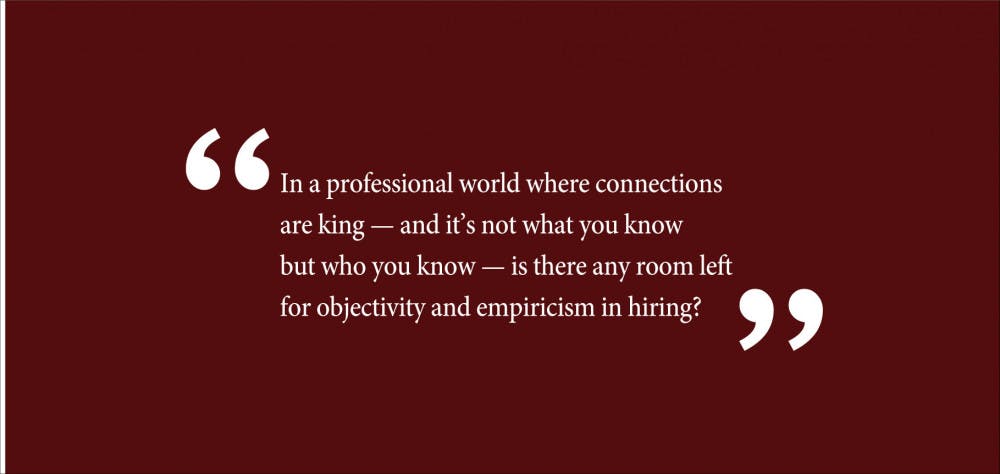Most Americans believe in meritocracy. Polls show Americans, more than most people in other countries, say intelligence and hard work, rather than birth and background, are what really count if you want to get ahead. Perhaps they’re right. But as many of my peers and I muddle about in the abyss of networking events, LinkedIn connections and can-you-refer-me’s, I got to thinking. In a professional world where connections are king — and it’s not what you know but who you know — is there any room left for objectivity and empiricism in hiring?
According to a Bureau of Labor Statistics and Yale University report, 70 percent of jobs are filled through networking. At that rate, it’s no wonder applicants spend most of their time making connections. Networking gives you more marginal return on your time than anything else; once at Brown, it is much harder to become more qualified than it is to establish a connection. That may be why, if you go to CareerLAB, they’ll tell you to spend 70 percent of your job search networking. But has anyone stopped to think that maybe a system that stresses connections over qualifications might not be the most desirable? After all, few would argue having a neighbor who plays golf with a company’s CEO makes you more worthy of a job there.
It’s almost certainly true that the majority of people who are hired because of a connection are qualified. It’s difficult to get a job as a trader or software engineer without knowing your stuff. But employers should be hiring not just any qualified applicant but the most qualified one. Currently, there are few instruments in place to ensure that this is the case.
Some will say, however, that connections operate at the margins, that the only time they really come into play is when there are two indistinguishable applicants. I don’t believe that for a second given the data, but let’s assume that’s true. If this connection-bias exists even at this level, there is necessarily someone, somewhere down the line who lost out on a job because they didn’t grease the right wheels. That hardly lives up to the idea of meritocracy Americans rightly champion.
What is perhaps most egregious about this system is that an existing series of highly predictive, empirical indicators of future job success are rarely utilized. Whether this is due to a lack of resources, a desire to continue the nepotistic practices of old or just plain laziness is unclear. Studies show, two measurable criteria can successfully predict job performance — emotional intelligence and cognitive ability.
What should surprise people is that such indicators are rarely measured in the job application process. To be certain, there are many employers (especially in STEM fields) who do use testing measures. But the majority of employers have abandoned empiricism and have instead relied on the wholly unscientific, completely subjective job interview and their own personal connections to make hiring decisions. Whether the solution is to require applicants to take a survey designed to measure emotional intelligence, an IQ test or a job-specific aptitude test, any metric that would add some more objectivity to the process would be a welcomed addition. After all, if you have to take the SAT to apply to college, why should it be any different for a job?
Some have argued that these measures don’t tell the whole story. The argument usually goes something like, “no single number can represent intelligence.” For example, one problem with IQ tests is that there is currently no way to normalize for differences caused by upbringing and environmental factors. But the solution to imperfect empirical measures is to make them more perfect and fair, not to abandon them in favor of networking and, generally, some of the least scientific, most subjective practices available. This doesn’t mean aptitude tests should be the only factor, but they deserve a place at the table.
The truth is, we’re wasting an enormous amount of time and resources trying to become the most well-connected applicants when we could be spending that time becoming the most qualified. We can’t blame people who network, as it’s in their self-interest to do so. And I for one think that as long as the system is what it is, I want to live in the same world as everyone else (that’s why you’ll, from time to time, see me standing, conflicted, in the middle of a networking event). But I’d much prefer that didn’t matter. It seems hardly necessary to elucidate the virtue of a society where the smartest, hardest-working people have the opportunity to rise from the bottom of the social ladder to the top of the heap. If that’s the goal, we need to start getting more scientific.
Andrew Reed ’21 can be reached andrew_reed@brown.edu. Please send responses to this opinion to letters@browndailyherald.com and op-eds to opinions@browndailyherald.com.





